(Small Dog Syndrome - Dog believes he is the pack leader to humans)
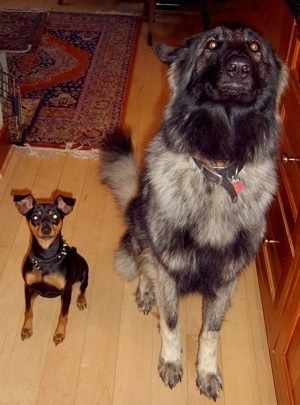
Are you one of those people who prefer larger dogs? Do you know someone who has told you that they prefer larger dogs because small dogs are yappy and snappy? Whether we are a large dog person or a small dog person, one thing we all would agree on, is the larger percentage of small dogs tend to have a different type of temperament than medium and large dogs. Small dogs have earned the reputation of being yappy, snappy, jealous, protective, wary of strangers and not the greatest child companion and, unfortunately, it has become widely accepted. Similar to the myth that Pit Bulls are all vicious fighting dogs whose jaws lock and they will not let go until their prey is dead. That's just the way some small dogs are. Right?
I received a package and my two Boxers went over to greet the UPS driver. I called the dogs back and the driver explained he didn't mind saying hello to my dogs. He could tell they were friendly, then added.... "It's those small dogs you have to watch out for."
So why do little dogs tend to act differently than large dogs? They are all the same type of animal, a mammal of the Canidae family, of the order Carnivora: Canis lupus familiaris, which is a domesticated subspecies of the wolf. Commonly referred to as a canine. This type of animal has instincts that need to be fulfilled in order for the animal to be happy and balanced. Let's take a closer look at how we treat large and medium dogs, as opposed to how we treat small and toy dogs.
Many behaviors we humans do not allow large dogs to get away with we find cute in small dogs. For example:
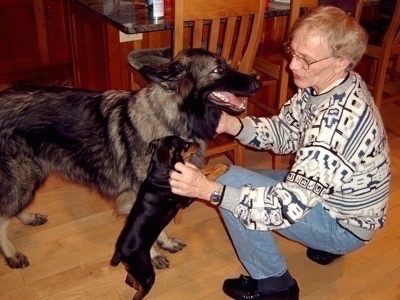
Jumping
If an 80-pound German Shepherd jumps up on a human, everyone agrees that this behavior needs to be corrected. Everyone sees this as a problem and the owners would seek help from a trainer, and/or read up on it on the Internet to remedy the behavior. At the very least, the dog would be locked in a separate room when guests arrived to protect the guests from getting hurt.
Now picture a little 8-pound Miniature Pinscher jumping up on a human. You look down and I’ll be darned, it's kind of cute. It does not hurt and people think "The dog likes me!"
But what does it really mean? If dogs were human this would be true ... but they are not. Jumping has a totally different meaning to a dog than it does a human. It's a dominancy and respect issue. For a dog, space is a sign of respect and when you allow your little dog to jump on a human you are allowing them to disrespect a human. You are allowing them to display pack leader behaviors.
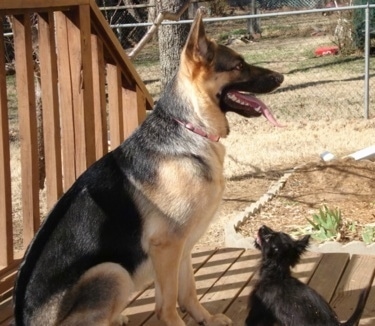
Sadie, the 70-pound GSD, with Rudy, a 4-pound Chorkie.
Growling
If a German Shepherd were to growl at your guest, you and your guest both know there is a problem. Something has to be done. However, if that tiny 6-pound Chihuahua growls, well it's just what he does. He's a Chihuahua, right? Wrong... There is no difference, in a dog’s mind, for a German Shepherd to be growling at a human than there is for a Chihuahua. It's just another behavior we humans let those tiny dogs get away with.
Other Dogs
If your little 5-pound Yorkshire Terrier decides to bark and growl at another dog while you are walking down the street, or as another dog passes by your house, it's almost seen as cute, because you see it as your tiny dog thinking they are a big dog. However, if your 120 pound Akita barks and growls at another dog, the dog is more likely to be put in their place and told to stop. The fact is, dogs should never be allowed to display dominant behaviors. Whether it be a huge or tiny dog, their pack leaders (humans) should tell the dogs "NO" and follow through until the dog understands this is not an acceptable behavior. And for the record, dogs do not "think" they are either big or little. They live in the moment and are just what they are, reacting to the moment. To dogs, size means nothing.
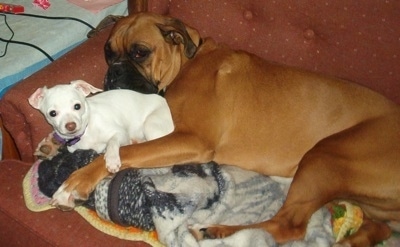
Roxanna the Boxer laying down with Miya, the Jack Chi hybrid.
Space
If you were eating dinner or working at your computer and your 70-pound Boxer comes running over and jumps up on your lap, chances are you would knock them back down telling them "No, not now, I am busy". However, if that 5-pound Maltese jumps up on your lap, well it's just cute. He loves you and just wants to be on you. There's that space issue again. Pack leaders decide when and where to do things. The pack leader belongs on top. It is ok for your little lap dog to sit on your lap. However, it has to be at times when YOU invite them.
Claiming the Human
If you are sitting down watching TV on the couch, your little dog can jump up next to you on the couch, so long as your dog understands it is your couch, not theirs. You need to make your dog wait until you invite them to climb into your lap. When a dog makes it a habit of jumping up on a human at their own free will, we humans see it as love and affection. However, to a dog it is a claim. The dog is trying to own you. So the next time you notice your dog is adamant about being on you, remember, he is claiming you not loving you. The human needs to claim their own space back and the dog must be told they can only climb on top when the human invites them.
If you feel your dog is jumping on you in an "I own you" way, it is best not to put nor knock the dog on the floor. Rather, use your fingers to bite her off (poking with enough intensity to make the dog react by moving). You need to communicate with your body language until they move off of the person by themselves. Make them move off; do not physically move the dog. When you see the dog settling down into a calm submissive state, (head down low, not making eye contact, ears back, tail relaxed and not tucked in, not rigidly high), then it is ok to invite them on you, if that is what YOU want. However, if the dog once again gets in an "I own you" stance, they need to be moved off again. Making the dog move, not by you moving the dog. The dog needs to be the one physically moving off.
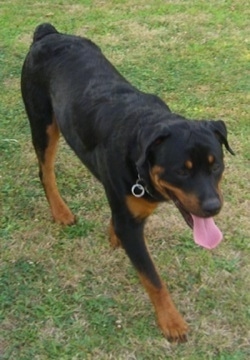
Jeremy, the Rottweiler.
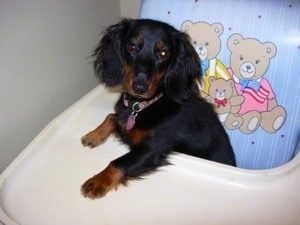
Francis, the Long Haired Miniature Dachshund.
Aggression
If your 120-pound Rottweiler decided to viciously bark at your housekeeper... you KNOW you have a problem. However, if your tiny little Dachshund does it, you inform the housekeeper to avoid the dog. The little dog may hide under the table barking and growling, is told to be quiet, but the correction is never really followed through on. The houseguest is told to not put their hands under the table. However, if this were a Rottie, the behavior would be addressed. Small dogs are more likely to be allowed to display dominant behaviors that should never be accepted.
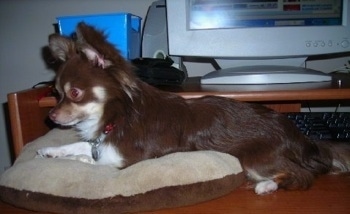
Prince, the longhaired Chihuahua.
Lap Dogs
Ever see a small dog jump up on its owners lap and growl at anyone who comes too close? The owner feels the dog is "protecting" them "because they love me". When actually the dog is "Claiming" "THEIR" property. Talk about allowing a dog to be alpha. Now imagine a Doberman Pinscher on that same person's lap, snarling if someone comes to close. Picture in your mind going back and forth, Chihuahua on their owner's lap growling... Doberman Pinscher on their owner's lap growling.
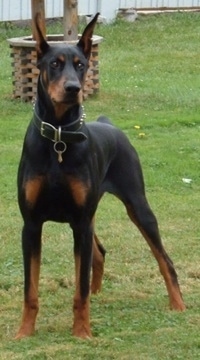
Romeo, the Doberman Pinscher.
Chihuahua, Doberman.... Chihuahua, Doberman... While it may seem less of a big deal for the Chihuahua to display this type of dominate behavior IN A DOG’S MIND there is no difference between a Chihuahua doing this and a Doberman Pinscher or German Shepherd exhibiting this behavior. Yet a large percentage of small dogs are allowed to display this behavior.
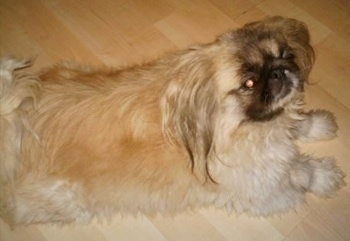
Luna, the Pekingese.
Walks
If someone were walking a 7-pound Pekingese and they were pulling on the lead as hard as they could to get near a tree to pee on it, most dog walkers would simply hold the lead and allow the dog to pull way out in front. What's the harm? The dog is not strong enough to knock a person down and you know you have a good grip on the lead, right?
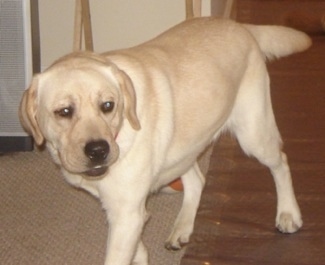
Chanel, the Labrador Retriever.
Whereas if a 70-pound Labrador Retriever were pulling you as hard as they could, there is a good chance they may just drag the human across the pavement. Large dogs are more likely to be told to behave on a lead than little dogs. However, even most large dogs do not walk properly on a lead. Most dogs (large and small) take their owners for a walk (in front of the human) when they should be beside or behind them (pack leader goes first). Large dogs are, at the least, mostly taught not to pull. Whereas not only do small dogs walk out in front, they also pull without being corrected. Dogs who act very excitedly when their humans come home are showing signs of a lack of exercise and/or leadership. For a dog, excitement does not indicate happiness. In most cases, it is a sign of an unbalanced state. When you come home after being gone, avoid speaking to your dog in an excited manner. If we see dogs has human, a dog not being excited and happy does not make sense. However, we must remember dogs are canines, not humans.
How about those sleeping arrangements?
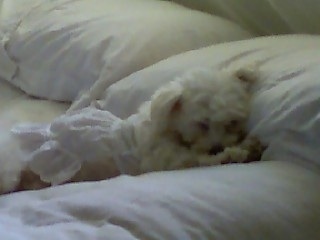
Bella, the 7-pound Malti-pom, "She's very quiet, and refuses to sleep at the end of the bed, she wants her head on the pillow, and her body under the covers right in between us!"
Large and medium size dogs are less likely to be allowed to sleep at the top of the bed next to a person's pillow. There simply is not room for both human and a large dog. If a large dog is allowed on the bed, they will often be told to sleep at the foot of the bed. Small dogs are more likely to be allowed to sleep right on a human's pillow. In the dog world, the pack leader sleeps in the highest (height wise) most comfortable place. And for those very tiny dogs who cannot jump on the bed themselves, they get to bark and TELL THE HUMAN when to put them on the bed and when to take them back off the bed. In a dog's mind only the pack leader tells others what to do. It is not necessarily a bad thing to allow your dog to be on your bed, so long as YOU are deciding when they can get on the bed and when they need to get down. Just keep in mind in the dog world, the pack leader sleeps in the most comfortable spot; so do not allow your dog to push you out of your spot. Your dog needs to lie around YOU, not you around THEM.
The Yappy Trait
While some dogs have more of a tendency to get yappy. The yappy traits have everything to do with the way they are treated by the owner. For instance, if the dog lacks a pack leader and feels THEY are the pack leader they may become yappy every time you leave them alone. Or become yappy as they try to get YOU to follow THEIR commands.
If you fall into the "Small Dog Syndrome" and allow a dog to take over the home, they will tend to be more yappy. Small dogs who see their humans as 100% pack leader and are told to hush when they do bark, get daily walks and are content with themselves are less likely to be little yappers.
The Nervous Trait
When a dog appears scared, nervous, stressed, or otherwise upset in any way, we humans tend to pet them, stroke their coat, and talk to them in a soothing manner. We tell them everything is ok. We do this with both large and small dogs, but we tend to do it even more with the smaller dogs. We pick up the little dog and cuddle them every time they look upset. We humans feel good about giving this type of comfort. It's human nature and our little dogs are our babies.
This type of reassurance works on humans, it's what humans do and we understand this type of comfort. However, when the canine animal is in an unstable state of mind and is given a human consolation (treated like a human) it intensifies the dog's state (stress, fear, nervousness etc.). In the dog world when a dog is in an unstable state and you try to reassure them by giving affection, the dog sees you as being in a weaker state than their own. The canine species can read human energy. They read sympathy as weak energy. With their primal instinct to have order in their pack, it is very disturbing for a dog in a weak state of mind to be surrounded by other weak pack members. At these times there is no pack leader and chaos is present as no one is providing direction. The same is true in ALL human societies. That is why leaders are elected or allowed to be in place. It intensifies the dog's instability, sometimes to the point where the dog, in their already unstable state, tries to be your pack leader. In the dog's mind you are now weaker than they are, which instinctually puts the dog in a higher alpha position than you. Instinct tells a dog that the stronger member is higher in the pack order. This ensures the packs survival. You need to give off a stronger, more stable energy that the dog can feed from.
Many little dogs suffer from instability due to their likelihood of being babied and over protected. When large dogs are upset, since we cannot pick them up, they are less likely to be treated in this manner.
Separation Anxiety
Dogs who believe they are the pack leader often develop separation anxiety. Followers are not allowed to leave the pack leader but pack leaders can leave the followers.
List of dominate behaviors which can occur in dogs (This list is not yet complete)
Besides the obvious guarding, growling and biting many dogs display a variety of dominant behaviors that commonly go unrecognized by their humans. Dogs very rarely display the highest level of dominance overnight. There are usually signs leading up to it over the years and dominate alpha dogs do not always growl and bite. If the owners are giving the dog what they want there sometimes is no reason for the dog to growl or bite unless they are challenged. Dogs understand that they exist in a human world. After all, who gives them food and opens the door for them to go potty? When humans perform these tasks on demand from the dog though, why wouldn't the dog think they're the leader? It is easy for dogs to get the impression they are alpha in their pack. Since many canine alpha behaviors are not acceptable in human society, for example biting being one of the alpha communication tactics it is important for humans to remain the leaders over their dogs.
Below are some common behaviors dogs display when they believe they are above humans. Keep in mind that a dog does not have to display all of these behaviors to be in a dominant frame of mind. Sometimes an alpha dog will only display a few of the behaviors and at random times, depending on what the dog decides they feel like doing at any given moment. Smarter dogs tend to challenge the pack order more then dogs of average or below average intelligence.
Stubbornness
Demanding
Pushiness
Begging
Pushing a toy into you in order to get you to play with them.
Nudging to be pet.
Sitting in high places looking down on everything.
Barking or whining at humans which many owners consider "talking" (without a command to do so).
Jumping or putting their paws on humans without a command to do so.
Persistence about going in and out doorways before humans.
Persistence about walking in front of humans while on a lead.
Not listening to known commands.
Dislikes people touching their food.
Standing proud on a human lap.
Persistence about being on top, be it a lap or stepping on your foot.
Persistence about where they sleep (i.e. on your pillow).
Annoyance if disturbed while sleeping.
Likes to sleep on top of their humans.
Licking (giving kisses) in a determined and focused manner.
Carrying themselves with a proud gait, head held high.
Not liking to be left alone and getting overly excited upon the humans return. (See Separation Anxiety in Dogs)
Conclusion
The bottom line is; small dogs are no different than large dogs. What gives them their different temperaments is that humans treat them differently. We over protect them and treat them like babies. Things we do not allow large dogs to do which are common pack leader issues because of the dogs size are addressed. These are issues all dogs need to have addressed, yet the smaller dogs tend to not get this discipline.
If you are unsure how to gain control back from your dog, or if you think you are at risk of being bitten, please hire a professional to help you before you give your dog to a shelter. This commonly sentences them to Death Row. This will (or at least should) cause you to feel remorse and guilt that you will have to deal with (to varying degrees) for the rest of your life.
To learn more about dog psychology and what makes a dog tick, we strongly suggest Cesar Millan DVD's and or Cesar Millan Books to every dog owner, from Chihuahua to Pit Bull
. An excellent guide to












0 comments:
Post a Comment